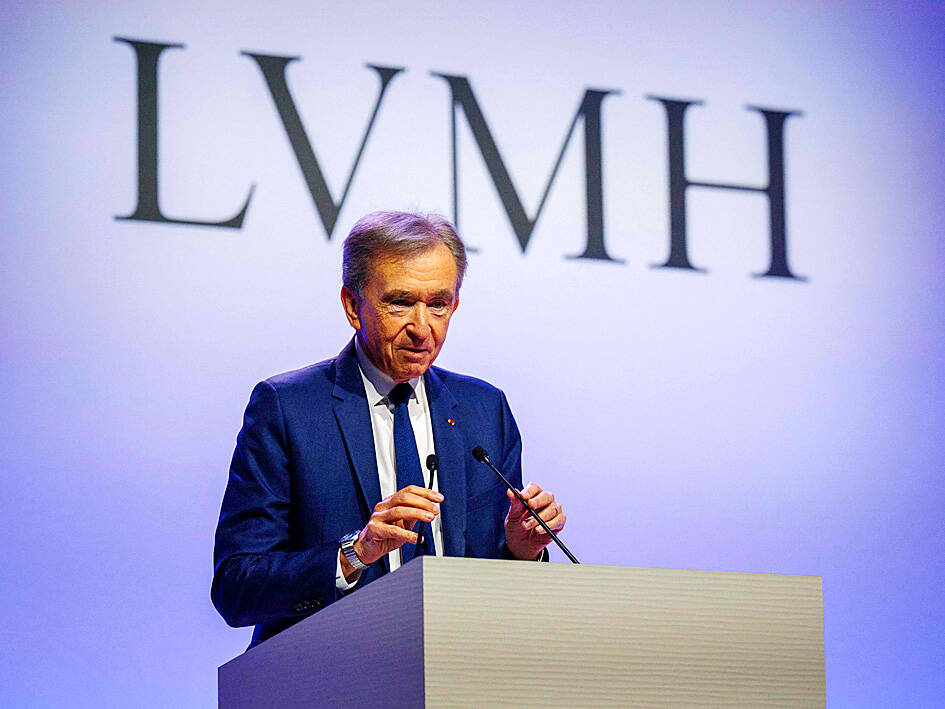LVMH Moet Hennessy Louis Vuitton SE’s sales of fashion and leather goods declined in the fourth quarter of last year, casting doubt on the prospects for a quick recovery in luxury demand.
Sales at the key unit, which includes the Louis Vuitton and Christian Dior brands, slipped 1 percent on an organic basis as wealthy holiday shoppers remained cautious.
Overall revenue at LVMH increased only 1 percent from a year earlier.

Photo: AFP
Both figures were slightly better than estimates, but disappointed investors after an upbeat report from rival Richemont earlier this month.
LVMH shares fell as much as 5.5 percent in Paris early yesterday, after rallying more than 30 percent from their low in November last year.
LVMH’s update raised concerns that the industry’s recovery from last year’s slump — caused in part by Chinese shoppers reining in high-end purchases after years of splashing out — might be slow and uneven.
Sales in the region that includes China dropped 10 percent year-on-year in the fourth quarter, the only geographic area that did not show growth.
“What I expect is to see a gradual recovery,” LVMH chief executive officer Bernard Arnault said of China during a presentation on Tuesday.
“The environment was severely impacted by COVID, then there was a strong recovery, followed by another crisis — the real-estate crisis — so it’s going to take some time,” Arnault added.
Overall, the situation globally was better in the period, but the improving trend still needs to be confirmed, LVMH chief financial officer Jean-Jacques Guiony said.
Profit at LVMH disappointed, even as the company lowered its overall marketing costs by 5 percent last year.
Recurring operating income dropped 14 percent last year to 19.6 billion euros (US$20.4 billion), missing estimates. One-time costs had an impact, including charges related to the Paris Olympic Games, Guiony said.
Still, there were signs of resilience at the luxury group. Sales at the watches and jewelry unit, which includes Tiffany and Bulgari, unexpectedly rose in the fourth quarter, more evidence that wealthy shoppers are favoring so-called hard luxury items, rather than the soft luxury of handbags and evening wear. Tiffany sales rose 9 percent year-on-year in the period.
Arnault struck an upbeat tone at the presentation.
He said this year has started relatively well, with Louis Vuitton posting double-digit growth so far this year.
Arnault also said he is confident that struggling brand Dior will make progress this year, and predicted a “booming” US market, a country he visited last week for US President Donald Trump’s inauguration.
The wine and spirits business, which has been in a slump following a pandemic-era surge, could recover in the next two years, he said. A sale of the Moet Hennessy drinks unit is not on the agenda, he added.

SEEKING CLARITY: Washington should not adopt measures that create uncertainties for ‘existing semiconductor investments,’ TSMC said referring to its US$165 billion in the US Taiwan Semiconductor Manufacturing Co (TSMC, 台積電) told the US that any future tariffs on Taiwanese semiconductors could reduce demand for chips and derail its pledge to increase its investment in Arizona. “New import restrictions could jeopardize current US leadership in the competitive technology industry and create uncertainties for many committed semiconductor capital projects in the US, including TSMC Arizona’s significant investment plan in Phoenix,” the chipmaker wrote in a letter to the US Department of Commerce. TSMC issued the warning in response to a solicitation for comments by the department on a possible tariff on semiconductor imports by US President Donald Trump’s

The government has launched a three-pronged strategy to attract local and international talent, aiming to position Taiwan as a new global hub following Nvidia Corp’s announcement that it has chosen Taipei as the site of its Taiwan headquarters. Nvidia cofounder and CEO Jensen Huang (黃仁勳) on Monday last week announced during his keynote speech at the Computex trade show in Taipei that the Nvidia Constellation, the company’s planned Taiwan headquarters, would be located in the Beitou-Shilin Technology Park (北投士林科技園區) in Taipei. Huang’s decision to establish a base in Taiwan is “primarily due to Taiwan’s talent pool and its strength in the semiconductor

An earnings report from semiconductor giant and artificial intelligence (AI) bellwether Nvidia Corp takes center stage for Wall Street this week, as stocks hit a speed bump of worries over US federal deficits driving up Treasury yields. US equities pulled back last week after a torrid rally, as investors turned their attention to tax and spending legislation poised to swell the US government’s US$36 trillion in debt. Long-dated US Treasury yields rose amid the fiscal worries, with the 30-year yield topping 5 percent and hitting its highest level since late 2023. Stocks were dealt another blow on Friday when US President Donald

UNCERTAINTY: Investors remain worried that trade negotiations with Washington could go poorly, given Trump’s inconsistency on tariffs in his second term, experts said The consumer confidence index this month fell for a ninth consecutive month to its lowest level in 13 months, as global trade uncertainties and tariff risks cloud Taiwan’s economic outlook, a survey released yesterday by National Central University found. The biggest decline came from the timing for stock investments, which plunged 11.82 points to 26.82, underscoring bleak investor confidence, it said. “Although the TAIEX reclaimed the 21,000-point mark after the US and China agreed to bury the hatchet for 90 days, investors remain worried that the situation would turn sour later,” said Dachrahn Wu (吳大任), director of the university’s Research Center for